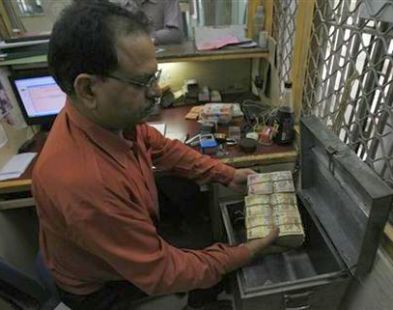Public sector banks accounted for over 90 per cent of total non-performing assets (NPAs) that the banking sector registered in 2013-14.
 Of Rs 2.40 lakh crore (Rs 2.40 trillion) gross NPAs reported by Indian banking system in 2013-14, Rs 2.16 lakh crore (Rs 2.16 trillion) gross NPAs came from the public sector banks, Parliament was informed.
Of Rs 2.40 lakh crore (Rs 2.40 trillion) gross NPAs reported by Indian banking system in 2013-14, Rs 2.16 lakh crore (Rs 2.16 trillion) gross NPAs came from the public sector banks, Parliament was informed.
Private sector banks had gross NPAs of Rs 22,738 crore (Rs 227.38 billion) as of March 31, 2014.
"The government has advised PSBs (Public Sector Banks) to constitute a board level committee for monitoring of NPAs and recovery, appointment of nodal officers for recovery at the head office ... to conduct special drives, for recovery of loss assets and has instructed PSBs that write-offs should not be more than recovery," Finance Minister Arun Jaitley said in a written reply to the Rajya Sabha.
As of September 30 of the current fiscal 2014-15, gross NPAs or bad loans of public and private sector banks stood at Rs 2.41 lakh crore (Rs 2.41 trillion) and 26,571 crore (Rs 265.71 billion) respectively.
The combined gross NPAs of public and private sector banks were at Rs 1.76 lakh crore (Rs 1.76 trillion) and Rs 1.31 lakh crore (Rs 1.31 trillion) in 2012-13 and 2011-12 respectively.
Jaitley said RBI has issued instructions to banks to review slippages in asset classification in the borrowal accounts with outstanding Rs 5 crore (Rs 50 million) and above by board of directors of the bank and review NPA accounts which have registered recoveries of Rs 1 crore (Rs 10 million) and above.
To remove bottlenecks in the recovery of bad debts, the Enforcement of Security Interest and Recovery of Debts Laws Act 2012 has been passed by Parliament which came into force from January 2013, he said.
Replying to a separate question if there were violations to finance industrial houses and loans were furnished without guarantee, Minister of State for Finance Jayant Sinha said each is required to have a board-approved loan policy and it should cover all aspects of due diligence.
"Banks have to implement these instructions and adopt adequate safeguards in order to ensure that the banking activities undertaken by them are run on sound, prudent and profitable lines," Sinha added.











 © 2025
© 2025